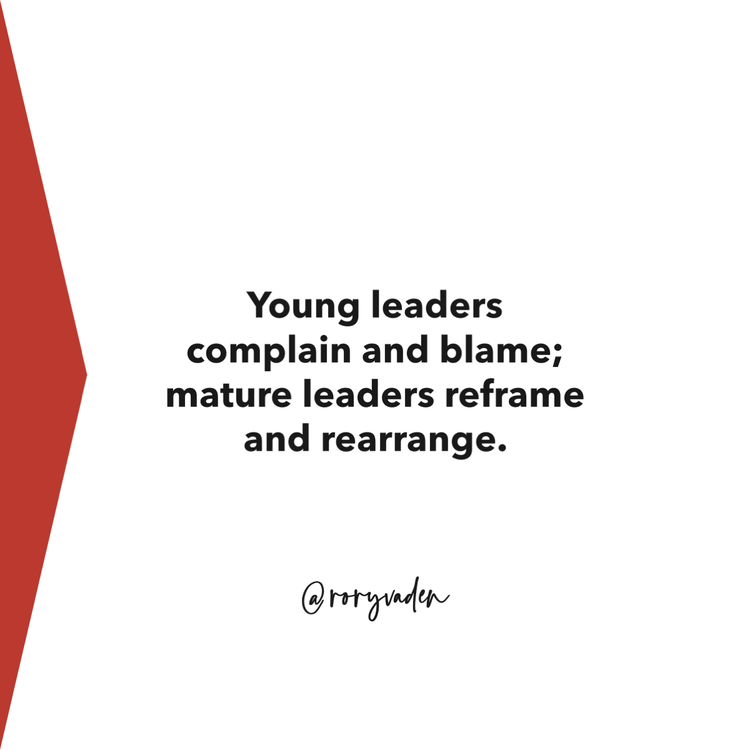The Difference Between a Young Leader and a Mature Leader
I want to share with you what I believe to be the single, greatest difference between a young leader and a mature leader.
The difference between these two is evidenced in how they respond to this certain thing.
I’ve learned this because I can look back on my career and my life as a leader. I’m still fairly young but I have been in leadership since my early twenties when I was a store manager at Sunglass Hut which I had started working at 16 years old. Then I started my own business and in college, I worked for an entrepreneurial venture. There I had 60 people who I had recruited that worked with me. In the mid-2000s, my wife and I started a company together. We grew it to 200 people and we later sold that company.
I’ve been in leadership for a long time and have a degree in leadership. I studied leadership in both high school and college.
As I look back at my own life, I started to identify this trend. This significant difference between who I once was and what I have learned and who I am now as a leader. We train and coach other leaders and we also are always developing leaders internally and we’re helping our clients develop leaders.
I am noticing the same trend exists for other people. It was not just me and my own life but that this is a natural part of the progression of becoming a great leader through this one straightforward concept where you can quickly identify somebody who is a young leader versus someone who is a mature leader.
Leadership Attitude

Here is how you do it.
You look at their response to problems.
The single, fastest way to tell if somebody is a young leader or a mature leader is by looking at the way they respond to problems.
Here’s how the natural progression typically works. This may not be a hundred percent of the time true, but based on previous experience, it is pretty spot on.
What happens to this? Where do leaders come from?
Leaders typically come from being somebody being promoted because they did an excellent job.
I want to give you more responsibility. I want to make you the leader.
There’s a big shift here that most people do not realize.
When people get promoted, they often think because they did such a good job and now they’re becoming a leader, they just need to do more of the thing they had been doing.
It is completely the opposite.
Being a leader is not about doing more good things than you’ve been doing. It’s about trying to help other people to get to do those good things.
You probably got promoted because you were good at doing things. You were efficient. You were timely. You were reliable, etc.
What happens is a young leader gets hit with problems because now they’re leading other people. Other people are creating problems because other people don’t perform as well as they performed as individual leader.
Well, guess what? That is leadership.
That’s why you’re the leader because you’re capable and equipped to deal with problems.
But what young leaders do is complain about problems.
They get frustrated that they’re having problems because they’re not used to dealing with problems. They’re not used to having difficult situations because they’re used to doing things well themselves.
When you become a leader, there are lots of problems. There are problems created by other people.
It will feel to a young leader as somehow unfair. It will feel like they’re taking the brunt of other people’s mistakes.
Here’s the second way to identify someone who is a young leader. They will blame other people. They will spend time and energy pointing out who is responsible for the problem.
Why do they do that?
Well, because they’re frustrated. They also don’t want the fact that there is a problem to reflect poorly on them because they’re used to having their reputation be protected by excellence. The fact that they do things well.
It becomes a strike to them. They internalize it as a strike to them that there are these problems.
What they do is they complain that there are problems and often they will blame. They will make it clear to everyone who is the source of the problem to protect themselves, their ego, and reputation so other people know they’re not the source of the problem.
How do mature leaders respond to problems?
Mature leaders respond differently to problems. The first thing that they do is accept that there are problems.
You see, a mature leader knows that leadership is about problems. Leadership is about nothing other than solving problems. A mature leader wastes no time, no energy, and no resources being frustrated that there is a problem.
A mature leader knows that problems are what gives them job security. They know that leadership is dealing with problems.
That’s why you’re the leader. You’re capable, competent, and able to deal with these problems.
Once you’re used to this and become detached from the emotions of the fact that there are problems, you expect them because you become wise enough to know problems are leadership.
That the job is solving problems.
While most young leaders complain, what mature leaders do is reframe. They reframe problems as their job. Not as a weakness in me or my character or that everything is falling apart. They don’t ride in the emotions of it.
This is what I do for a living. I solve problems. That is what makes me the leader. That is why I am here. That is why I got promoted. Somebody thinks I can solve problems.
If you are the entrepreneur, you made that decision or God made that decision to place that calling on your life that you’re responsible and able to solve really big problems.
They don’t complain. They reframe.
The other thing that mature leaders do, which is different, is they don’t spend time worrying about who the person is responsible for the problem. They instead just spend their time rearranging things to solve the problem. They have been through enough problems that they now have the perspective, wisdom, experience, and the repetition of pointing out who is responsible for the problem does virtually nothing to help resolve the problem.
It might save face for you, but you weren’t put in a leadership role to save face or to build your ego.
You were put in a leadership role to solve problems.
What mature leaders do is they quickly move beyond whose fault it is and instead move quickly to find the solution. Not everyone can do this.
They don’t blame. They rearrange things. They find another way. They figure it out. They rearrange roles. They rearrange resources. They rearrange their time. They dig into the details and they rearrange who’s responsible for what, and they rearrange things so that they can solve problems.
How to Grow as a Leader
If you put all this together, what do you find?
It’s very simple.
Young leaders complain and blame; mature leaders reframe and rearrange.
You can identify the level of maturity that a leader has by simply and solely looking at their attitude and how they view problems as well in their behaviors, actions, and responses to problems.
Because guess what?
If you have problems, that’s means that you’re the leader.
That’s why you’re there.
You are capable of solving those problems.
It is the job.
That is what leadership is all about.

















